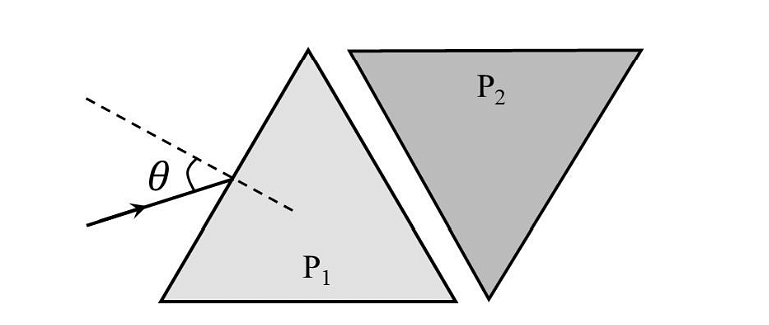Question:
For any real numbers $\alpha$ and $\beta$, let $y _{\alpha, \beta}( x ), x \in R$, be the solution of the differential equation
$\frac{d y}{d x}+\alpha y=x e^{\beta x}, y(1)=1$
Let $S=\left\{y_{\alpha, \beta}(x): \alpha, \beta \in R\right\}$. Then which of the following functions belong(s) the set $S$ ?
For any real numbers $\alpha$ and $\beta$, let $y _{\alpha, \beta}( x ), x \in R$, be the solution of the differential equation
$\frac{d y}{d x}+\alpha y=x e^{\beta x}, y(1)=1$
Let $S=\left\{y_{\alpha, \beta}(x): \alpha, \beta \in R\right\}$. Then which of the following functions belong(s) the set $S$ ?
$\frac{d y}{d x}+\alpha y=x e^{\beta x}, y(1)=1$
Let $S=\left\{y_{\alpha, \beta}(x): \alpha, \beta \in R\right\}$. Then which of the following functions belong(s) the set $S$ ?
Updated On: Sep 19, 2024
- $f(x)=\frac{x^{2}}{2} e^{-x}+\left(e-\frac{1}{2}\right) e^{-x}$
- $f(x)=-\frac{x^{2}}{2} e^{-x}+\left(e+\frac{1}{2}\right) e^{-x}$
- $f(x)=\frac{e^{x}}{2}\left(x-\frac{1}{2}\right)+\left(e-\frac{e^{2}}{4}\right) e^{-x}$
- $f(x)=\frac{e^{x}}{2}\left(\frac{1}{2}-x\right)+\left(e+\frac{e^{2}}{4}\right) e^{-x}$
Hide Solution
Verified By Collegedunia
The Correct Option is A, C
Solution and Explanation
(A) $f(x)=\frac{x^{2}}{2} e^{-x}+\left(e-\frac{1}{2}\right) e^{-x}$
(C)$f(x)=\frac{e^{x}}{2}\left(x-\frac{1}{2}\right)+\left(e-\frac{e^{2}}{4}\right) e^{-x}$
(C)$f(x)=\frac{e^{x}}{2}\left(x-\frac{1}{2}\right)+\left(e-\frac{e^{2}}{4}\right) e^{-x}$
Was this answer helpful?
0
0
Top Questions on Differential equations
- Let f(x) be a continuously differentiable function on the interval (0, ∞) such that f(1) = 2 and
\(\lim\limits_{t→x}\frac{t^{10}f(x)-x^{10}f(t)}{t^9-x^9}=1\)
for each x > 0. Then, for all x > 0, f(x) is equal to- JEE Advanced - 2024
- Mathematics
- Differential equations
- If \((t+1)dx=(2x+(t+1)^3)dt\) and \(x(0)=2\), then \(x(1) \)is equal to:
- JEE Main - 2024
- Mathematics
- Differential equations
- If \(\frac {dy}{dx} - \frac {(sin2x)}{(1+cos^2x)}y = \frac {sinx}{1+cos^2x }\)and \(y(0) =0\) then \(y(\frac \pi2)\) is ………..
- JEE Main - 2024
- Mathematics
- Differential equations
- If \(\frac{dy}{dx}\)= \(\frac{(x+y-2)}{(x-y)}\), and y(0) = 2, find y(2)
- JEE Main - 2024
- Mathematics
- Differential equations
- The solution of differential equation \(y\frac {dx}{dy}=x(log_e x-log_e y+1),\ x>0, y>0\) and passing through \((e,1)\) is
- JEE Main - 2024
- Mathematics
- Differential equations
View More Questions
Questions Asked in JEE Advanced exam
- Let \(S=\left\{\begin{pmatrix} 0 & 1 & c \\ 1 & a & d\\ 1 & b & e \end{pmatrix}:a,b,c,d,e\in\left\{0,1\right\}\ \text{and} |A|\in \left\{-1,1\right\}\right\}\), where |A| denotes the determinant of A. Then the number of elements in S is _______.
- JEE Advanced - 2024
- Matrices
- A block of mass \(5 kg\) moves along the \(x-\)direction subject to the force \(F = (−20x + 10) N,\) with the value of \(x \) in metre. At time \(t = 0 s,\) it is at rest at position \(x = 1 m\). The position and momentum of the block at \(t = (\pi/4)\) s are
- JEE Advanced - 2024
- Work-energy theorem
- Two equilateral-triangular prisms \(P_1 \)and \(P_2\) are kept with their sides parallel to each other, in vacuum, as shown in the figure. A light ray enters prism \(P_1\) at an angle of incidence 𝜃 such that the outgoing ray undergoes minimum deviation in prism \(P_2\). If the respective refractive indices of \(P_1\) and\( P_2\) are \(√ 3 /2\) and \(√3\), then \(\theta = sin{−1}[\sqrt \frac{ 3}{ 2} sin ( \frac{\pi}{B} )],\) where the value of \(\beta\) is ______.

- JEE Advanced - 2024
- Ray optics and optical instruments
- Let \(\overrightarrow{OP}=\frac{\alpha-1}{\alpha}\hat{i}+\hat{j}+\hat{k},\overrightarrow{OQ}=\hat{i}+\frac{\beta-1}{\beta}\hat{j}+\hat{k}\) and \(\overrightarrow{OR}=\hat{i}+\hat{j}+\frac{1}{2}\hat{k}\) be three vector where α, β ∈ R - {0} and 0 denotes the origin. If \((\overrightarrow{OP}\times\overrightarrow{OQ}).\overrightarrow{OR}=0\) and the point (α, β, 2) lies on the plane 3x + 3y - z + l = 0, then the value of l is _______.
- JEE Advanced - 2024
- Vector Algebra
- Let \(\vec{p}=2\hat{i}+\hat{j}+3\hat{k}\) and \(\vec{q}=\hat{i}-\hat{j}+\hat{k}\). If for some real numbers α, β and γ we have
\(15\hat{i}+10\hat{j}+6\hat{k}=α(2\vec{p}+\vec{q})+β(\vec{p}-2\vec{q})+γ(\vec{p}\times\vec{q})\),
then the value of γ is ________.- JEE Advanced - 2024
- Vector Algebra
View More Questions
JEE Advanced Notification
 JCECEB has released Seat Matrix of Online Counselling, Check HereSep 19, 2024
JCECEB has released Seat Matrix of Online Counselling, Check HereSep 19, 2024The Seat Allotment for 3rd round is scheduled for Sep 22. Provisional seat allotment (3rd round), Document Verification & Admission in the Concerned Institute is scheduled for Sep 23 - 30, 2024



